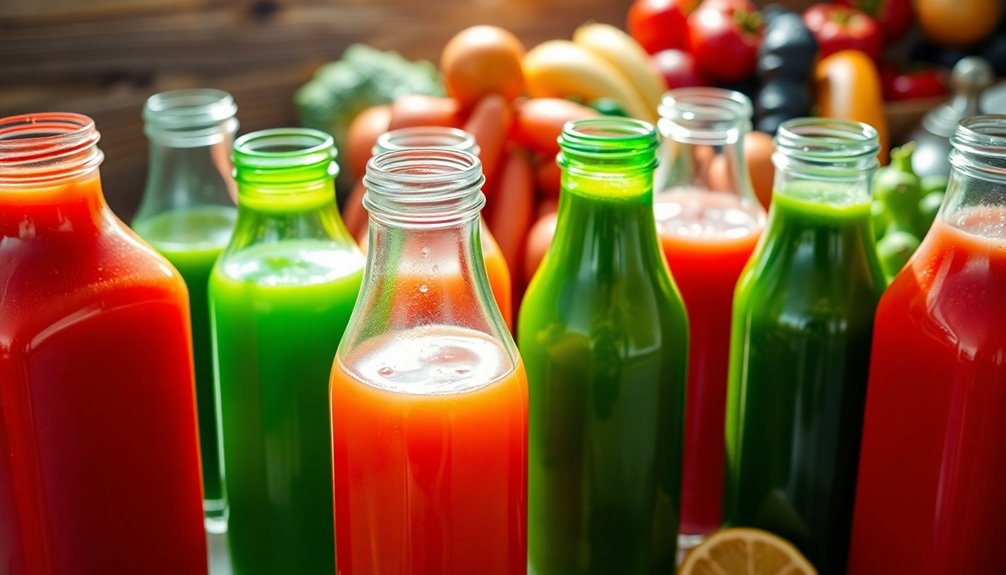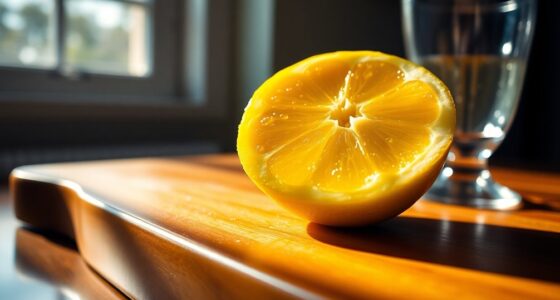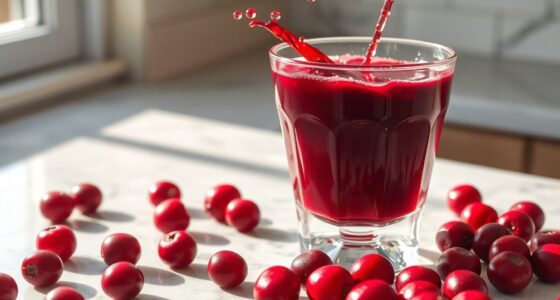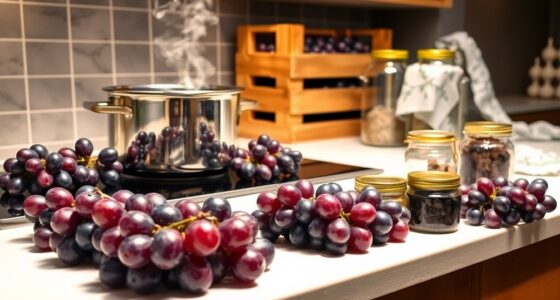Cold-pressed juice usually lasts about 3 to 5 days in the fridge. If stored properly between 34-40°F, you can extend its freshness and nutritional benefits. Some might say it lasts up to 7 days, but that's on the optimistic side. Always check for signs of spoilage like off smells or browning before consuming. To get the most out of your juice, stick to the recommended storage practices. There's more to learn about keeping your juice fresh!
Key Takeaways
- Cold-pressed juice generally lasts 3 to 5 days in the refrigerator, with some sources optimistically suggesting up to 7 days.
- Unrefrigerated juice should be consumed within 8 hours to ensure optimal taste and nutrition.
- Proper storage at 34-40°F (1.6-4.4°C) helps preserve nutrients and flavor for longer periods.
- Freezing cold-pressed juice can extend its shelf life to 6 to 12 months while retaining nutrients.
- Signs of spoilage include separation, browning, off smells, and mold presence, indicating the juice should be discarded.
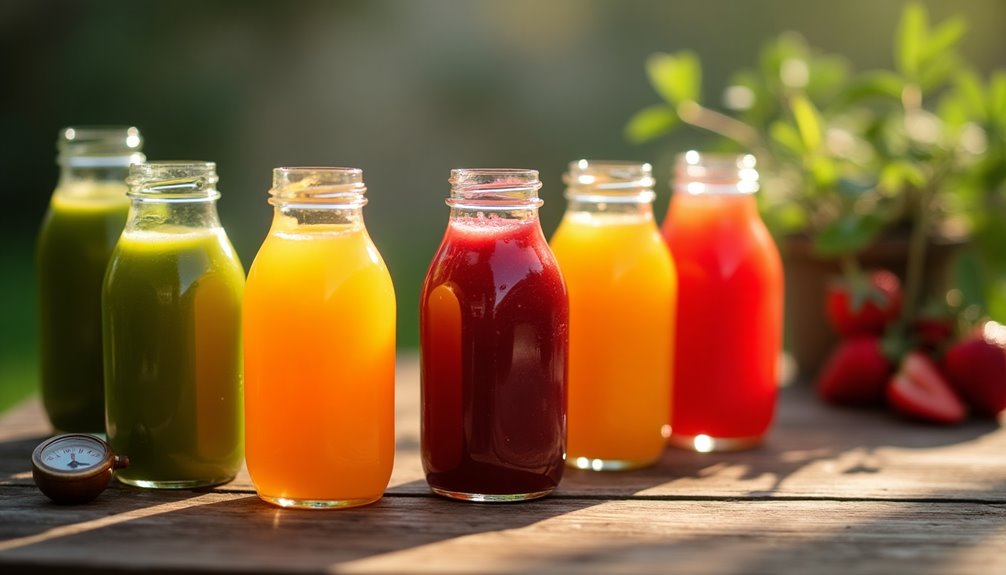
When you enjoy a refreshing bottle of cold-pressed juice, you might wonder how long it stays fresh. This delicious drink, packed with nutrients, has a shelf life that’s relatively short compared to conventional juices. Generally, when you store cold-pressed juice properly in the refrigerator, it can last about 3 to 5 days. Some sources even suggest it could last up to 7 days, but that’s on the optimistic side. To maximize freshness, it’s essential to keep the juice in an airtight container and avoid exposure to light or heat. If you’re ever in doubt about how long does cold pressed juice last, you can always check for signs of spoilage, such as an off smell or changes in color and texture. Remember, consuming it sooner rather than later not only ensures better taste but also retains the maximum nutritional benefits.
To maximize freshness, you should always keep your cold-pressed juice at the right temperature. The ideal storage temperature is between 34-40°F (1.6-4.4°C). Staying within this range helps maintain nutrients and minimizes nutrient degradation, which can happen quickly if the juice isn't kept cold enough.
If you leave your juice unrefrigerated, it's best to drink it within 8 hours for optimal taste and nutrition. After that, the levels of vitamin C start to decline significantly, which can affect both flavor and health benefits.
Proper storage is crucial for extending the life of your juice. If you plan to keep it for a more extended period, consider freezing it. When frozen in airtight containers, cold-pressed juice can last anywhere from 6 to 12 months. This method helps prevent oxygen exposure and moisture loss, ensuring that the juice retains as many nutrients as possible even after being frozen. Just remember to leave some space in the container for expansion as the juice freezes.
While you might be tempted to drink that bottle of juice that's been sitting in the fridge for a little too long, it's essential to check for signs of spoilage first. Look for separation, browning, off smells, or even mold. These are clear indicators that the juice has gone bad, and you should discard it for safety. Spoiled juice not only loses its delicious flavor but can also pose health risks.
If you pay attention to storage conditions and consume your juice within the recommended time frame, you can enjoy the full benefits of cold-pressed juice. With its vibrant flavors and rich nutrient profile, it's a delightful addition to your diet.
Just remember that freshness is key, and maintaining optimal refrigeration is your best bet to keep those nutrients intact.
Frequently Asked Questions
How Long Does Cold-Pressed Juice Stay Fresh?
When you've got cold-pressed juice, it typically stays fresh for about 3 to 5 days in the fridge, assuming you store it properly.
You should keep it between 34-40°F to maintain its quality.
If you leave it out, aim to drink it within 8 hours.
If you're looking to extend its life, freezing can keep it good for 6 to 12 months, as long as you use airtight containers.
How to Tell if Cold-Pressed Juice Is Bad?
Ever wondered how to tell if that vibrant green juice has turned?
Look for signs of spoilage like separation or brown foam; these indicate oxidation.
If you notice a grayish color or strong, off smells, it's time to toss it.
Mold growth is a definite no-go.
Remember, if it's been sitting out for more than eight hours, it's likely lost its freshness and nutritional value.
Trust your senses; they won't lead you astray!
How Long Can I Keep My Juice After Juicing?
After juicing, you should ideally drink your cold-pressed juice within 72 hours for the best quality and nutrient retention.
If you store it properly in the fridge, it can last between 3 to 5 days, but some sources suggest up to 7 days under optimal conditions.
If you need to keep it longer, consider freezing it; it can last 6-12 months when stored in airtight containers.
Always check for spoilage signs before consuming.
Do You Have to Drink Cold-Pressed Juice Right Away?
You don't have to drink cold-pressed juice right away, but it's best to enjoy it soon after making it.
If you store it properly in the fridge, you can extend its freshness for a few days.
Just remember, the longer you wait, the more nutrients it may lose.
Keep an eye out for any signs of spoilage, like separation or a strange smell, before deciding whether to drink it.
Conclusion
In conclusion, cold press juice typically lasts about 3 to 5 days in the fridge, but here's an interesting fact: it can lose up to 50% of its nutrients within just 24 hours if not stored properly. So, if you want to enjoy all those fresh vitamins and enzymes, drink it soon after making or buying it. Remember, the fresher, the better! Keep your juice stored tight to maximize its lifespan and benefits.
Cindy thoroughly researches juicing trends, techniques, and recipes to provide readers with practical advice and inspiration. Her writing style is accessible, engaging, and designed to make complex concepts easy to understand. Cindy’s dedication to promoting the advantages of juicing shines through her work, empowering readers to make positive changes in their lives through the simple act of juicing.

